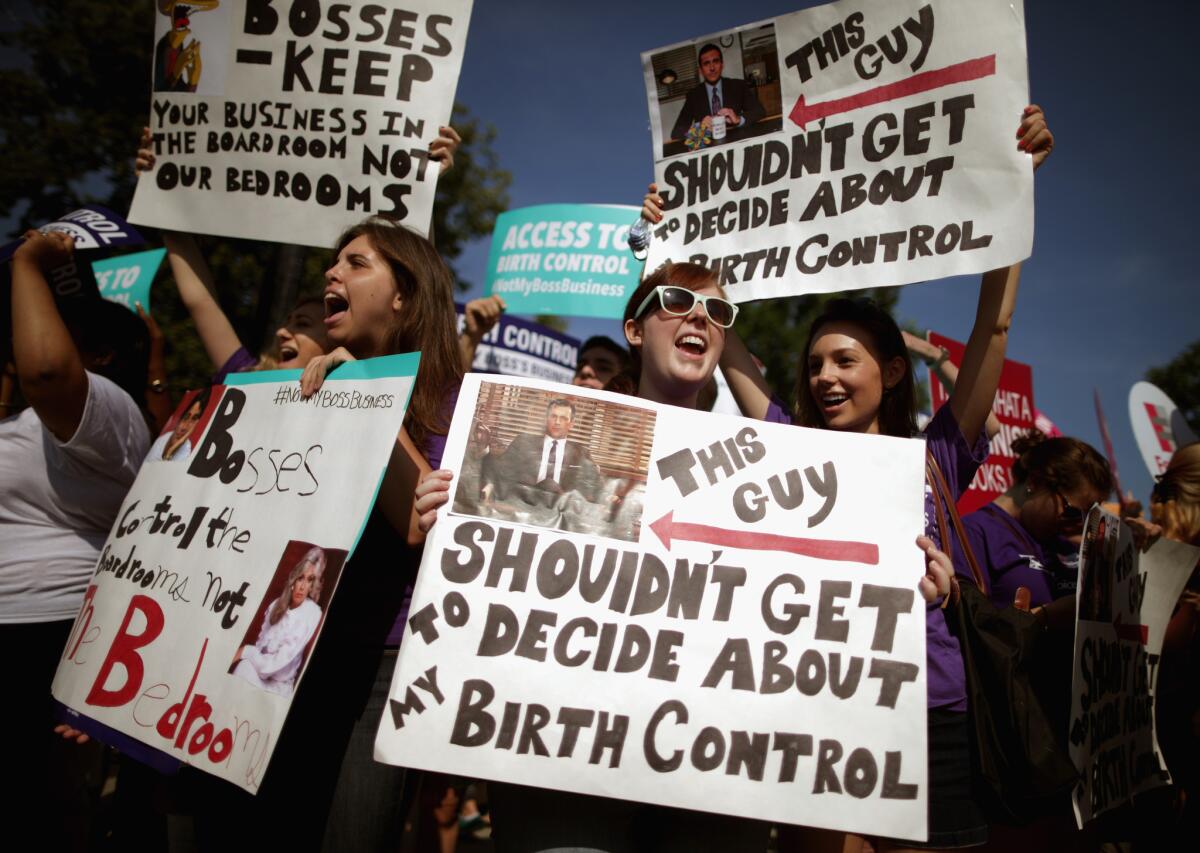Supreme Court’s Hobby Lobby decision is a slap in the face to women

- Share via
Today’s Supreme Court Hobby Lobby decision, which puts the religious beliefs of an employer above the medical needs of female employees, is head-shakingly bad.
And not just for women and their families.
It’s bad for anyone who works for a closely held, for-profit company whose owners embrace unscientific medical beliefs for religious reasons, and choose to impose those beliefs on employees.
In a 5-4 decision, penned by Justice Samuel Alito, the court said Obamacare’s contraceptive mandate violated the Religious Freedom Restoration Act, a law enacted by Congress in 1993 to ensure the government could not substantially burden a person’s free exercise of religion. A corporation, the court held, is effectively a person under this law, and may hold and exercise religious beliefs.
The ruling in Burwell vs. Hobby Lobby, said the court, will be applied narrowly--only to owners of “closely held” companies who have sincere religious objections to certain forms of birth control. The decision will not apply, for example, to employers who object on religious grounds to vaccinations and blood transfusions, said Justice Samuel Alito, writing for the majority.
Alito does not say what legal principle will stop employers with other wacky but sincerely held religious beliefs from contesting the law. (Because there isn’t one.)
Nor does he elaborate on why a religious objection to birth control is more defensible than a religious objection to other sorts of medical care. (Because it isn’t.)
All of which means, as Justice Ruth Bader Ginsburg wrote in her dissent, this decision “is bound to have some untoward effects.” For one thing, she notes, “closely held” does not mean “small.” Hobby Lobby, after all, has 500 outlets and 16,000 employees. The “candy giant” Mars Inc., Ginsburg said, has 72,000 employees and $33 billion in revenue. Cargill, also “closely held,” employs some 140,000 people and has revenues of more than $136 billion.
“The proof will be in the pudding,” said Planned Parenthood Action Fund President Cecile Richards on Monday morning on a conference call with representatives of the ACLU, NARAL Pro-Choice America and the National Women’s Law Center. “Everyone will be free to say that various laws violate their religious rights. We will surely see more claims brought.”
No one has said that a woman who works for Hobby Lobby or other for-profit companies with religious owners will be prevented from using the birth control that she and her doctor deem appropriate, even if she must pay out of her own shallow pocket.
But that is not the issue. The issue is the principle at stake, the one pitting a woman’s private medical decisions against her boss’ religious beliefs. Today, women lost.
Henceforth in America, the medical decisions of women who work for closely held for-profit companies may be shaped by the gods their employers choose to worship.
This is a ground-shaking departure for a court that, as Ginsburg noted, ruled in 1982 that an Amish employer could not refuse to withhold Social Security taxes for religious reasons; in 1985 that employers could not fail to pay the minimum wage for religious reasons; and in 1990 that a Baptist church had to provide women equal pay for equal work despite religious objections.
It is worth noting that the Green family, who are Christian, oppose on religious grounds only four of 20 forms of birth control approved by the FDA. Specifically, they object to two kinds of IUDs and two types of “morning after” pills. Each of those, they claim, prevents the implantation of an already-fertilized egg. Because the Greens believe that life begins at conception, they say these methods effectively end pregnancy, rather than prevent it.
That may be their sincere belief, but it is wildly at odds with the scientific consensus that a pregnancy begins at implantation, as I noted here.
This decision is an unalloyed insult to women, slapped in the face by five male justices who will never know what it’s like to have to use an IUD not because you don’t want children, but because getting pregnant could kill you—from pulmonary hypertension, congenital heart disease or Marfan syndrome. Or because previous birth control methods have failed you and an IUD, while expensive, also happens to be the most reliable contraceptive on the market. Or because you suffer from a heavy menstrual bleeding, and resulting anemia, that an IUD can help regulate. Or because your partner’s condom broke during sex and you can’t possibly afford to get pregnant right now.
“For the first time, the court says certain for-profit companies can use their religious beliefs to deny their employees a benefit that they are entitled to under the law,” said ACLU Deputy Legal Director Louise Melling. “It’s a case of exceptionalism when it comes to women’s rights.”
Here’s the thing: Women understand what is best for them. They understand when they are being patronized or singled out for discriminatory treatment. Some 99% of women use birth control at some point in their lives. They don’t want their bosses, for any reason, getting involved in their family planning decisions.
And here is what women have over corporations: They can vote. Corporations can’t. Well, at least not yet.
Please follow me on Twitter: @robinabcarian
More to Read
Sign up for Essential California
The most important California stories and recommendations in your inbox every morning.
You may occasionally receive promotional content from the Los Angeles Times.











